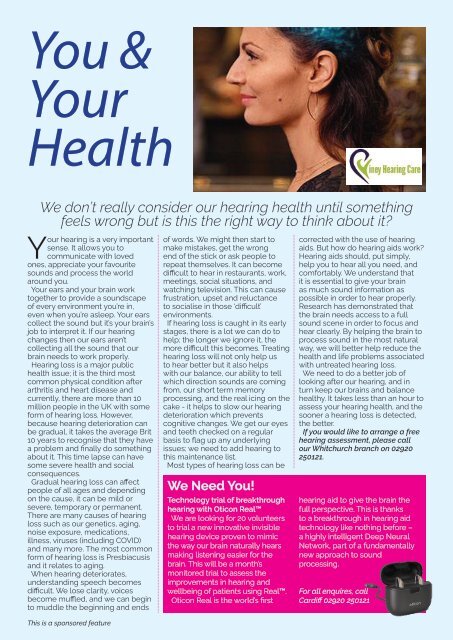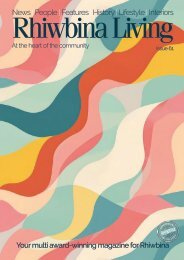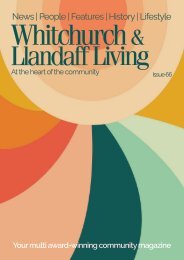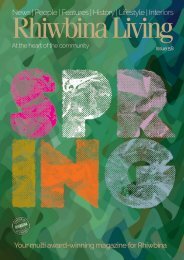Whitchurch and Llandaff Living Issue 68
Issue 68 of the award-winning Whitchurch and Llandaff Living magazine.
Issue 68 of the award-winning Whitchurch and Llandaff Living magazine.
Create successful ePaper yourself
Turn your PDF publications into a flip-book with our unique Google optimized e-Paper software.
You &<br />
Your<br />
Health<br />
We don’t really consider our hearing health until something<br />
feels wrong but is this the right way to think about it?<br />
Your hearing is a very important<br />
sense. It allows you to<br />
communicate with loved<br />
ones, appreciate your favourite<br />
sounds <strong>and</strong> process the world<br />
around you.<br />
Your ears <strong>and</strong> your brain work<br />
together to provide a soundscape<br />
of every environment you’re in,<br />
even when you’re asleep. Your ears<br />
collect the sound but it’s your brain’s<br />
job to interpret it. If our hearing<br />
changes then our ears aren’t<br />
collecting all the sound that our<br />
brain needs to work properly.<br />
Hearing loss is a major public<br />
health issue; it is the third most<br />
common physical condition after<br />
arthritis <strong>and</strong> heart disease <strong>and</strong><br />
currently, there are more than 10<br />
million people in the UK with some<br />
form of hearing loss. However,<br />
because hearing deterioration can<br />
be gradual, it takes the average Brit<br />
10 years to recognise that they have<br />
a problem <strong>and</strong> finally do something<br />
about it. This time lapse can have<br />
some severe health <strong>and</strong> social<br />
consequences.<br />
Gradual hearing loss can affect<br />
people of all ages <strong>and</strong> depending<br />
on the cause, it can be mild or<br />
severe, temporary or permanent.<br />
There are many causes of hearing<br />
loss such as our genetics, aging,<br />
noise exposure, medications,<br />
illness, viruses (including COVID)<br />
<strong>and</strong> many more. The most common<br />
form of hearing loss is Presbiacusis<br />
<strong>and</strong> it relates to aging.<br />
When hearing deteriorates,<br />
underst<strong>and</strong>ing speech becomes<br />
difficult. We lose clarity, voices<br />
become muffled, <strong>and</strong> we can begin<br />
to muddle the beginning <strong>and</strong> ends<br />
This is a sponsored feature<br />
of words. We might then start to<br />
make mistakes, get the wrong<br />
end of the stick or ask people to<br />
repeat themselves. It can become<br />
difficult to hear in restaurants, work,<br />
meetings, social situations, <strong>and</strong><br />
watching television. This can cause<br />
frustration, upset <strong>and</strong> reluctance<br />
to socialise in those ‘difficult’<br />
environments.<br />
If hearing loss is caught in its early<br />
stages, there is a lot we can do to<br />
help; the longer we ignore it, the<br />
more difficult this becomes. Treating<br />
hearing loss will not only help us<br />
to hear better but it also helps<br />
with our balance, our ability to tell<br />
which direction sounds are coming<br />
from, our short term memory<br />
processing, <strong>and</strong> the real icing on the<br />
cake - it helps to slow our hearing<br />
deterioration which prevents<br />
cognitive changes. We get our eyes<br />
<strong>and</strong> teeth checked on a regular<br />
basis to flag up any underlying<br />
issues; we need to add hearing to<br />
this maintenance list.<br />
Most types of hearing loss can be<br />
We Need You!<br />
Technology trial of breakthrough<br />
hearing with Oticon Real<br />
We are looking for 20 volunteers<br />
to trial a new innovative invisible<br />
hearing device proven to mimic<br />
the way our brain naturally hears<br />
making listening easier for the<br />
brain. This will be a month’s<br />
monitored trial to assess the<br />
improvements in hearing <strong>and</strong><br />
wellbeing of patients using Real.<br />
Oticon Real is the world’s first<br />
corrected with the use of hearing<br />
aids. But how do hearing aids work?<br />
Hearing aids should, put simply,<br />
help you to hear all you need, <strong>and</strong><br />
comfortably. We underst<strong>and</strong> that<br />
it is essential to give your brain<br />
as much sound information as<br />
possible in order to hear properly.<br />
Research has demonstrated that<br />
the brain needs access to a full<br />
sound scene in order to focus <strong>and</strong><br />
hear clearly. By helping the brain to<br />
process sound in the most natural<br />
way, we will better help reduce the<br />
health <strong>and</strong> life problems associated<br />
with untreated hearing loss.<br />
We need to do a better job of<br />
looking after our hearing, <strong>and</strong> in<br />
turn keep our brains <strong>and</strong> balance<br />
healthy. It takes less than an hour to<br />
assess your hearing health, <strong>and</strong> the<br />
sooner a hearing loss is detected,<br />
the better.<br />
If you would like to arrange a free<br />
hearing assessment, please call<br />
our <strong>Whitchurch</strong> branch on 02920<br />
250121.<br />
hearing aid to give the brain the<br />
full perspective. This is thanks<br />
to a breakthrough in hearing aid<br />
technology like nothing before –<br />
a highly intelligent Deep Neural<br />
Network, part of a fundamentally<br />
new approach to sound<br />
processing.<br />
For all enquires, call<br />
Cardiff 02920 250121

















